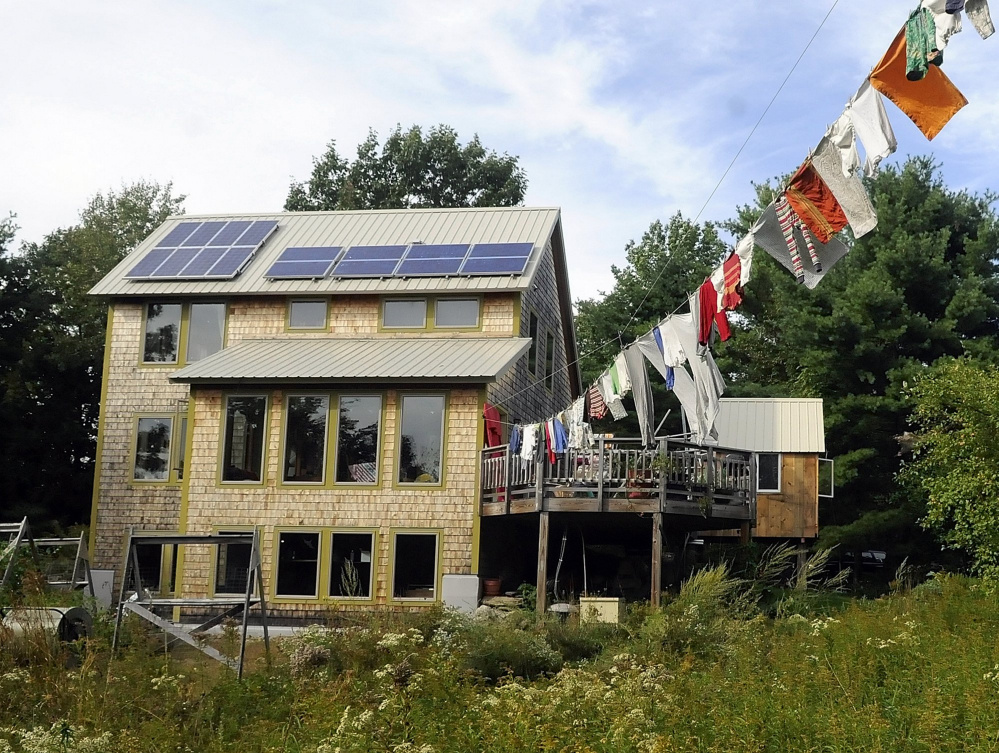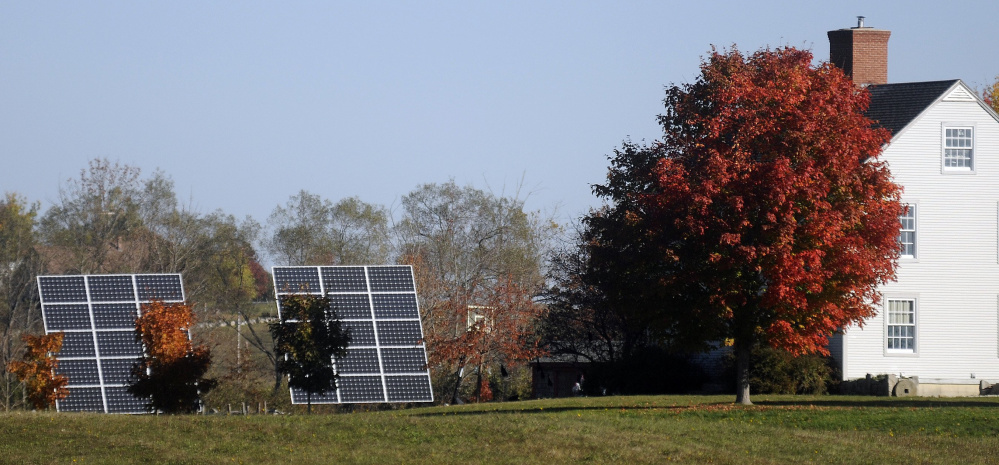HALLOWELL — Homeowners with solar-electric panels would be compensated for the power they produce at a full retail rate for 15 years, but those who wait until 2018 and a period after to go solar would see the credit gradually reduced over time.
That was the upshot of a rule approved Tuesday by the Maine Public Utilities Commission, an action that is bound to be challenged in the Legislature.
The rule seeks a middle ground in a contentious debate over what’s called net-energy billing or net metering, a longstanding financial incentive meant to promote renewable energy technology.
Clean-energy advocates and solar installers say retaining the full credit on net metering is important to growing solar energy use and provides benefits beyond power costs. Utilities and some politicians, including Gov. Paul LePage, counter that compensating homeowners for the excess power they sell to utilities shifts costs to electric customers who don’t have solar panels. They also say that falling prices of solar-electric equipment lessen the need for subsidies.
In trying to strike a balance, though, the PUC rejected arguments for retaining the full credit beyond this year.
Specifically, the rule would grandfather all existing net-meter customers, and any who install solar before Jan. 1, 2018, for 15 years. Their incentives would stay as they are today.
New customers who install solar over the next 10 years would have the credit on the transmission and distribution portion of the electric bill gradually decreased. For instance: After Jan., 1, 2018, net-solar customers would be credited 90 percent on the transmission and distribution portion of the bill, each year, for 15 years. They would still get a full credit on the supply portion of the bill.
The reasoning behind this formula, the PUC said, is to try to match financial incentives with the expected pace of falling equipment prices, thereby maintaining a similar payback on investment for homeowners.
The unanimous decision was the product of months of study. It was informed by technical and financial calculations, but also by testimony from hundreds of Maine residents, many of whom expressed a strong passion for solar as a way to blunt the impacts of climate change and fossil fuel dependence.
The outcome wasn’t surprising, given that it contained elements of a previous rule proposal by the commission. The reaction wasn’t unexpected, either.
The rule was immediately condemned by a newly formed coalition of solar installers, which called it “unworkable, onerous, and costly for ratepayers” and said it would cost jobs. Co-founded by ReVision Energy of Portland, the state’s largest solar installer, and San Francisco-based SunRun, the country’s largest rooftop company, the Northern New England Solar Industry Alliance urged the Legislature to step in and correct the PUC’s action. It called for “a long-term, balanced solar policy that recognizes solar’s value, rather than just slapping on a short-term bandage policy that will undoubtedly be subject to more political volatility in the near future.”
It has been clear for months that the Legislature would step in. Lawmakers, aided by clean-energy advocates and other interested parties, have drafted several bills this session dealing with various aspects of solar energy, including net metering.
It’s an indicator of strong public interest in the future of solar power in Maine, and sets the stage for another political battle involving LePage. Last spring, the Legislature failed by two votes to override LePage’s veto of a wide-ranging solar bill that would have restructured the financial incentives.
Soon after Tuesday’s decision, a Democrat who co-chairs the legislative committee that handles energy matters criticized the PUC’s changes.
“Clean renewable energy sources are the best pathway our state has to lower energy prices, more good-paying jobs and a smaller carbon footprint,” said Rep. Seth Berry, D-Bowdoinham. “The rule adopted today by the PUC seems to take us in the wrong direction by making major and disruptive changes despite overwhelming public input regarding risks to our energy and jobs markets.”
LePage also is unhappy with the PUC’s action, but for the opposite reason. Noting the state’s above-average electricity prices, LePage issued a statement saying the rule continued to shift the burden onto home customers and businesses that can’t afford it.
“Net energy billing customers should be compensated for the electricity they generate at fair market rates,” LePage said. “Other ratepayers should not be subsidizing those installations to make solar viable. If it cannot stand on its own two feet, they should not have to pay higher rates to some of the more affluent ratepayers.”
Net metering is a decades-old rule that requires utilities to credit the bills of small energy generators for the full retail price of all the electricity they send into the grid. Those credits chiefly help homeowners recover their investment in rooftop solar-electric panels. They continue to be paid as long as the power is being generated.
This arrangement was set up in the 1980s to help jump-start solar when the technology was new. But panel costs have fallen sharply in recent years and are projected to drop more in the near future.
That’s why utilities and some policymakers say it’s time to trim the incentive. As solar’s popularity grows, they say, the payments are shifting the cost of serving homes and small businesses with solar panels onto other customers.
But environmental advocates and solar installers say the value of this energy actually is greater than the cost of service. They point to a 2015 study by a consultant for the PUC to make their case. During deliberations on Tuesday, however, the three PUC commissioners each said that study was being misinterpreted.
The new rules were applauded by a former PUC commissioner who works as a consumer affairs consultant and has been active in the case.
“This is definitely a step in the right direction to reduce the transmission and distribution subsidies to solar customers,” said Barbara Alexander of Winthrop. “Those customers do not in fact provide substantial distribution services, when they generate power from their roof for some portion of the day.”
The commission’s new rule pertains only to solar installations at people’s homes, and not larger-scale “community” solar projects in which homeowners may buy shares. The agency decided to leave that issue to the Legislature.
Battles over net metering have been taking place across the country. The outcome of these skirmishes matters because thousands of jobs are tied to solar installations, and shifting policies about compensation have led many residents to put off investing in solar.
Tux Turkel can be contacted at 791-6462 or
tturkel@pressherald.com
Twitter: TuxTurkel
Send questions/comments to the editors.





Success. Please wait for the page to reload. If the page does not reload within 5 seconds, please refresh the page.
Enter your email and password to access comments.
Hi, to comment on stories you must . This profile is in addition to your subscription and website login.
Already have a commenting profile? .
Invalid username/password.
Please check your email to confirm and complete your registration.
Only subscribers are eligible to post comments. Please subscribe or login first for digital access. Here’s why.
Use the form below to reset your password. When you've submitted your account email, we will send an email with a reset code.